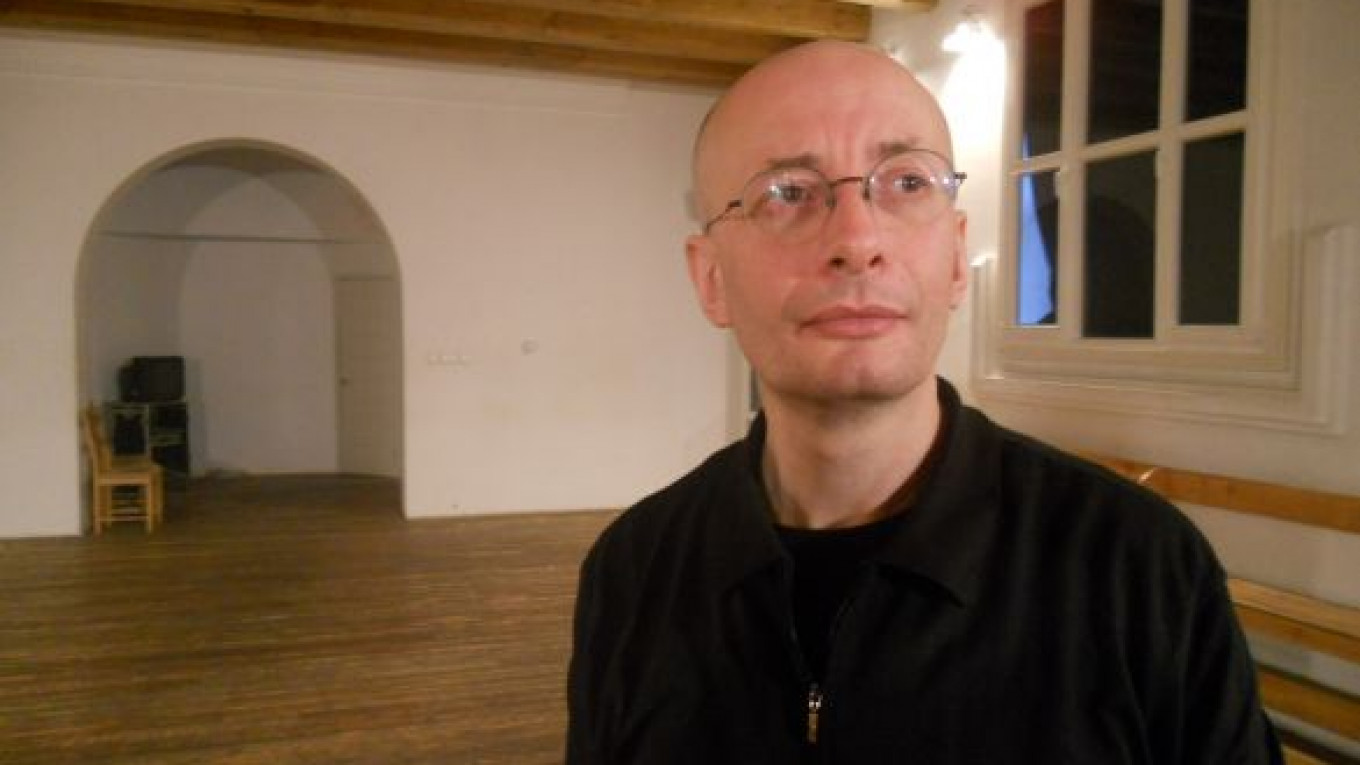Christophe Feutrier likes to talk about being on a journey, or a road.
He began his life in theater in his hometown of St. Etienne, France — where he says you either played soccer or made theater — but he has proved to be a difficult man to keep in one place.
This year Feutrier estimates he spent three months at his home in Paris, where he is the founder and director of the Trajectoire-ADM agency.
“ADM stands for ‘amour du monde,’ love of the world,” he says switching back and forth between Russian and French.
“I come home to unpack, make a few calls and argue with someone, usually a producer, before picking up and leaving again,” he adds with a laugh.
Over the last 20 years Feutrier has worked in China, Uzbekistan, Kazakhstan, Germany, France and other countries. In Russia he staged 10 productions in Omsk, Tomsk, Nizhny Novgorod, Kazan, Cheboksary, Zlatoust and Moscow.
His production of “Entre Nous” at Moscow’s Chelovek Studio Theater opened a decade ago and is still running in repertory.
Feutrier, who has an expressive face and is always quick to smile or laugh, is currently here rehearsing Valere Novarina’s enigmatic “The Imaginary Operetta.” The show opens Tuesday and Wednesday on the Manezh stage at the School of Dramatic Art.
Although the play only appeared 12 years ago, it is already “a modern classic,” the director informs me. Then he leans forward and asks, “Do you want to know what the play is about?”
Yes, I say, taking the bait.
“Nobody will ever know!” he declares quickly and laughs out loud.
“Actually, that’s a bad question to ask about this play,” Feutrier informs me suddenly in a more serious tone, at which point I realize that I’m grateful I didn’t really ask it.
“It’s about the end of civilization,” he declares. “Novarina says nothing about that in the play. He’s not preaching on a soapbox. But he imbedded the idea in the structure of the play.”
“Oh, and it’s a comedy,” he adds as an afterthought.
“The Imaginary Operetta” has delighted and baffled theater-goers ever since it was staged in Paris in 1998 by Claude Buchwald at Peter Brook’s Bouffes du Nord Theater. It uses seemingly nonsensical language and a lack of linear narrative to build a tale that has a tangible impact on an audience.
“As a philosopher,” Feutrier continues, “Novarina is convinced that we can no longer talk about the human being anymore. We have created so many sciences studying the human — anthropology, psychology, ethnography — that there is nothing more to be said or discovered. Novarina breaks all that down. He destroys the ‘I’ and all that’s left are words.”
Feutrier looks for an example to illustrate what he means and settles on the global financial crisis.
“It’s like Wall Street just before the crash,” he finally says. “Everybody’s shouting and yelling words, words, words, and then it all comes crashing down. Afterwards nothing is left but the words.”
In fact, there are more than words to “The Imaginary Operetta,” which is also a musical piece. The Russian production, however, will differ from the Paris production as a result of a reading that Feutrier staged in Moscow five years ago.
“Russian and French are so different,” he explains. “So I suggested composing new music to accompany the Russian text, and Novarina loved the idea,” the director explains.
Thus it is that this production will be performed to an entirely new score by Vartan Yeritsyan.
The show features actors who have been a part of the troupe or have collaborated with the School of Dramatic Art in recent years. Among them are Sergei Volkov, Sofya Yefimova and Oksana Mysina, who plays the role of the work’s author struggling to keep the characters in line.
Following the premiere of “The Imaginary Operetta,” Feutrier will continue his journeys. He is planning a new production of an as-yet undetermined Eugene Ionesco play in Germany, and he will oversee a French tour of Ionesco’s “Frenzy for Two,” which he staged in July in Avignon.
But Feutrier’s eyes light up most when he tells me what he’s planning for spring 2011 — a road trip from Chicago to Los Angeles on the famed Route 66.
“I want to see everything Kerouac wrote about,” he says, anticipating the pleasure that will bring him.
Who knows? He may just find a few theaters to work at on his way and spend the next 20 years working in the United States.
“The Imaginary Operetta” (Operetta Ponaroshku) plays Tuesday and Wednesday at 8 p.m. at the School of Dramatic Art, located at 19/27 Ulitsa Sretenka. Metro Sukharevskaya. Tel. 632-9344, www.sdart.ru.
Projected running time: 1 hour, 30 minutes.
A Message from The Moscow Times:
Dear readers,
We are facing unprecedented challenges. Russia's Prosecutor General's Office has designated The Moscow Times as an "undesirable" organization, criminalizing our work and putting our staff at risk of prosecution. This follows our earlier unjust labeling as a "foreign agent."
These actions are direct attempts to silence independent journalism in Russia. The authorities claim our work "discredits the decisions of the Russian leadership." We see things differently: we strive to provide accurate, unbiased reporting on Russia.
We, the journalists of The Moscow Times, refuse to be silenced. But to continue our work, we need your help.
Your support, no matter how small, makes a world of difference. If you can, please support us monthly starting from just $2. It's quick to set up, and every contribution makes a significant impact.
By supporting The Moscow Times, you're defending open, independent journalism in the face of repression. Thank you for standing with us.
Remind me later.







